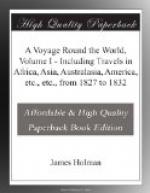Sunday, 15.—After divine service, I accompanied Captain Owen in a walk to a negro village, about two or three miles distant, and to which there was no distinct road, but merely a rough irregular path. There was little of interest to be seen there, and scarcely any refreshment to be procured; the blacks brought us a few young cocoanuts, of which we drank the milk. The only fruits to be had on the island, were pine-apples, plantains, bananas, lemons, limes, and a few more common kinds, all of which the blacks brought to the ship in their own boats; as also vegetables, namely, pumpkins, onions, cucumbers, tomatos, &c. The oranges do not come into season until September. The principal plantations were mandioc and coffee, and there was also a small quantity of cocoa; the coffee is rather celebrated for its flavour and quality. The prices vary a good deal, but we found the average from eight to twelve pounds for a dollar. The natives both roast, and sell, their coffee with a pellicle over the berry, and I should imagine it is to this circumstance that its singularly delicious flavour may be attributed. We found the place very gay, it being the festival of St. Antonio, the patron saint, which, considering it is a Portuguese town, and situated in such a demi-civilized part of the world, may be called rather a neat one. It contained about twelve hundred houses, and seven churches, most of these, however, were in a miserable state. There were not more than fifty Europeans on the island, the whole population of which does not exceed four thousand. The principal part of these were negroes, who, of course, were slaves[39], and the remainder were of different shades from black to white. This island has still the character of slave-dealing, in a small way, with some of the African nations. One of the gentlemen of the Eden, rode across the island to West-bay, about six miles distant, but the road was a mere footpath, and scarcely entitled to be considered a bridle-road. West-bay is where our men-of-war, on the African station, generally anchor to procure water. It is a place of no consequence, in a mercantile point of view, as it consists merely of a small negro village. We heard that the great merchant, Mr. Ferraro, had been at his house in town to-day, but he left it again without having shewn the courtesy to return Captain Owen’s visit; perhaps, he feared that such an effort of politeness might lead to a demand upon his hospitality, a virtue for which the Portuguese are not very remarkable, especially in their intercourse with Englishmen; in this respect, the Governor was no less a niggard of his attentions than the rest of his countrymen, giving no invitation either to Capt. Owen or any of his officers, whose ceremonious visit cost him, no doubt, infinite annoyance, as, upon that occasion, his Excellency was obliged to appear clean shaved, and in his full uniform, a laborious sacrifice to cleanliness and grandeur, at the expense of his accustomed habits of luxurious indolence and personal ease.




